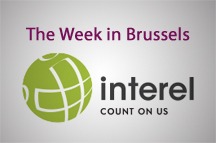 Chancellor Angela Merkel and President Hollande addressed the European Parliament in Strasbourg 25 years after Helmut Kohl and Francois Mitterand delivered an historic appeal for unity following the reunification of Germany. The Franco-German motor that drives Europe forwards is spluttering a bit, more like a dodgy VW than a BMW, but their call for more Europe to answer the continent’s problems was welcomed by the mainstream political groups and echoes the message delivered by Commission President Jean-Claude Juncker in his State of the Union speech last month. Not surprisingly, their message was less well received by the eurosceptics, with Nigel Farage quoting Tony Blair of all people, saying the EU was no longer about peace but power. Power is certainly a strong motivator for the parliament at the moment and as it sees its legislative workload diminish, it is re-inventing itself as the forum for national leaders to address a wider public. The Greek and Hungarian Prime Ministers, as well as Popes and Kings, have been recent visitors and all eyes are now on whether David Cameron will accept the invitation to enter the bear pit and set out his demands ahead of the UK referendum.
Chancellor Angela Merkel and President Hollande addressed the European Parliament in Strasbourg 25 years after Helmut Kohl and Francois Mitterand delivered an historic appeal for unity following the reunification of Germany. The Franco-German motor that drives Europe forwards is spluttering a bit, more like a dodgy VW than a BMW, but their call for more Europe to answer the continent’s problems was welcomed by the mainstream political groups and echoes the message delivered by Commission President Jean-Claude Juncker in his State of the Union speech last month. Not surprisingly, their message was less well received by the eurosceptics, with Nigel Farage quoting Tony Blair of all people, saying the EU was no longer about peace but power. Power is certainly a strong motivator for the parliament at the moment and as it sees its legislative workload diminish, it is re-inventing itself as the forum for national leaders to address a wider public. The Greek and Hungarian Prime Ministers, as well as Popes and Kings, have been recent visitors and all eyes are now on whether David Cameron will accept the invitation to enter the bear pit and set out his demands ahead of the UK referendum.
VW scandal leads to calls for EU supervisor
 Anger and frustration at who knew what and when over the VW defeat device scandal shows no sign of letting up. Industry Commissioner, Elzbieta Bienkowska, was accused by MEPs of being rather too “relaxed” and trusting that national authorities could handle the crisis and there were calls for an independent EU type approval authority to break the cosy relationship between the car industry and national supervisors. Members were incredulous that the Commission claimed to know nothing about the defeat device and that it had been left to the US authorities to uncover the fraud. Tory MEP Dan Dalton suggested that maybe those highly vocal critics of TTIP, the free-trade agreement with the US, should now accept that in many areas US standards and controls were superior to the EU's.
Anger and frustration at who knew what and when over the VW defeat device scandal shows no sign of letting up. Industry Commissioner, Elzbieta Bienkowska, was accused by MEPs of being rather too “relaxed” and trusting that national authorities could handle the crisis and there were calls for an independent EU type approval authority to break the cosy relationship between the car industry and national supervisors. Members were incredulous that the Commission claimed to know nothing about the defeat device and that it had been left to the US authorities to uncover the fraud. Tory MEP Dan Dalton suggested that maybe those highly vocal critics of TTIP, the free-trade agreement with the US, should now accept that in many areas US standards and controls were superior to the EU's.
More transparency in EU-Council negotiations
The murky world of trilogues, those behind-closed-doors negotiations between MEPs and the Council, are the subject of an investigation by the European Ombudsman and also a non-legislative report by German Green MEP, Sven Giegold. His report has the rather lofty title of “Transparency, accountability and integrity of the EU institutions” but basically boils down to an attempt to win back public trust in the way decisions are made at the EU level. In true transparent style, Giegold first published his initial recommendations on his website. He wants the minutes of the trilogue meetings made public in order to see how national positions influenced the final Council negotiating mandate. He also feels more can be done by both Commission and Parliament to reveal the “legislative footprint” of who has lobbied them throughout the process, by publishing who they have met and what their demands were. Expect stiff resistance to all these ideas.














